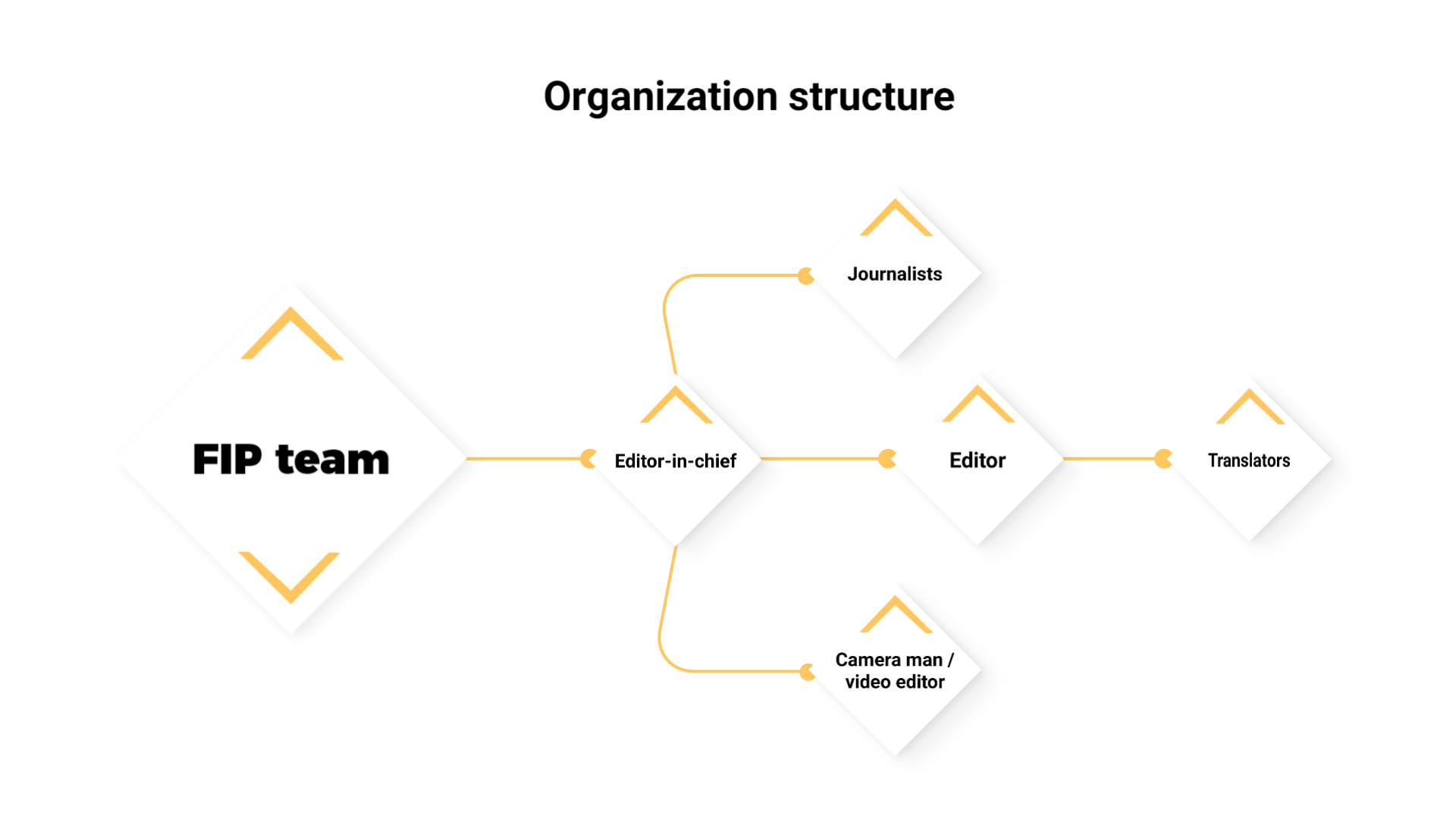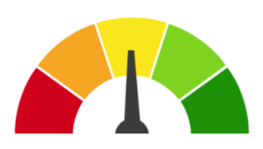Fact Investigation Platform (FIP.am) constitutes a separate team of the Union of Informed Citizens (UIC) NGO that acts as an independent media outlet specializing in fact-checking journalism. FIP.am has structural and editorial independence, as well as a code of conduct for FIP.am journalists (see below).
Organizational setup

The Editor-in-Chief is responsible for establishing the editorial policy, approving topics and articles, reviewing materials, and verifying the facts contained therein and reports to no one. The publishing editor is responsible for proofreading the articles and, if necessary, replacing the Editor-in-Chief and reports to the Editor-in-Chief.
Journalists-fact-checkers are responsible for monitoring the news, feed, social networks, the interviews and speeches of political, public and other figures, identifying topics, studying them, checking suspicious statements and facts, starting work on new topics in cooperation with the Editor-in-Chief, and submitting articles. They report to the Editor-in-Chief.
The cameraman-editor is responsible for preparing the multimedia files for publications and reports to the Editor-in-Chief.
The Social Media Specialist (SMM) is responsible for sharing articles on social platforms, tracking feedback and reactions, as well as making the content of the Fact Investigation Platform accessible to a wider target audience and effectively raising awareness of circulating disinformation and reports to the Editor-in-Chief.
The translation team comprises 2 English and Russian translators who report to the Editor-in-Chief.
Funding
Union of Informed Citizens (UIC) is the parent organization of FIP.am. UIC publicly lists the funding sources for each project, including the projects that fund FIP.am. FIP.am, in turn, publicly presents the project partners at the bottom of the website.
Code of conduct for journalists of the Fact Investigation Platform (Fact-checking commandments)
Check the authenticity of all quoted evidence and statements, do not manipulate or distort the quoted speech.
When using abbreviations for the first time in the text, writing the full version, indicating the abbreviation in parentheses is a must.
Include background covering additional information about the circumstances that preceded the given statement.
Include context: under what topic, discussion, question the given statement or claim was made.
Do not edit the direct speech, follow the established rules when abridging.
Use of direct speech is a must: specifically quote the passage to be checked.
Specify the positions of persons of concern (even Nikol Pashinyan, Ararat Mirzoyan and other well-known persons).
In case of long videos, specify the exact timecode and attach it to the text.
Do not use “RA” before the names of state authorities and officials․
Each statement shall be substantiated with references. References shall be from the original source (this rule can be violated only in extreme cases).
Simplify laws, legal and economic texts to the extent possible and write in accessible language (the text is not written for perusal by economists or lawyers).
When studying any topic, do a Google search for more information.
Read the full text of the documents before referring to them.
Do not express personal opinions.
Non-partisanship policy
FIP.am team members are obliged to put aside their political preferences and maintain absolute non-partisanship and impartiality during fact-checking. They shall not work for or be funded in any way by any political party or political party representative.
The organization ensures this criterion by signing a nonpartisanship agreement with all newly hired team members. In addition, for maximum credibility, team members continuously strive to develop their skills and knowledge to ensure accuracy, this being one of the fundamental principles of the organization’s mission.
Conflict of interest
Journalists working in the Fact Investigation Platform shall avoid all situations that could cause a conflict of interest, thereby jeopardizing their independence and impartiality.
Journalists shall not engage in any activity or relationships that could call into question their impartiality.
Journalists shall inform the editor in a timely manner if there is a potential for a conflict of interest while writing any article. In the event of a conflict of interest, the journalist shall refrain from working on the topic in question, handing it over to another journalist.
If necessary, FIP.am may disclose information about potential conflicts of interest and actions taken in order to maintain reader trust.
Independence and sources
The employees of the Fact Investigation Platform shall act independently, without influence or pressure from any external source, beneficiary, or stakeholder. Journalistic activity at FIP.am is carried out in the public interest, regardless of the individual, organization, or agency that provided the information. The source can never dictate how to present information or interpret facts.
All sources of information are subject to equal scrutiny and verification, regardless of their social, political, or financial status. Journalists cannot “trust” any source without proper verification.
Professional development
The Fact Investigation Platform emphasizes the need for continuous education and capacity development for all team members and constantly provides them with the opportunities to gain new knowledge.
Our journalists regularly participate in training courses, workshops, webinars, conferences, and other educational events to develop their skills, especially in fact-checking, media literacy, information security, and mastery of innovative tools.
We are also aware of the importance of internal training within the editorial office. To this end, each employee follows developments in the field of fact-checking, studies international best practice, and applies the knowledge gained in their work.
Location reporting
The Fact Investigation Platform places great importance on locating sources of information and accurately presenting the location of events, with the aim of conveying credible information to readers.
It is important for us to accurately present the location, clearly indicating the location of the event or source, namely, the country, the city, or the region.
When possible or necessary, FIP.am uses OSINT tools, satellite imagery, location analysis tools, or metadata to confirm the actual location of photos or videos.
Because we consider the fight against manipulation and disinformation as our main mission, especially during war or conflict coverage, when videos or photos are shared, our journalists try to verify the location of the data, avoiding manipulative or misleading influence.
In our publications, we also explain how the location was verified or how it was determined.
For security reasons, location reporting should be done with caution.
Policy for acceptance of fact-checking requests
With its primary goal to provide the public with accurate information and keep it free from disinformation, the Fact Investigation Platform is also committed to checking statements and information of interest to its readers.
As part of their job duties, Fact Investigation Platform journalists monitor Armenian broadcasters, online, print and social media outlets, including those created by political parties and/or the Russian government or with Russian affiliation (such as Sputnik). Armenia,” “Kommersant,” “Regnum,” “Ria Novosti”).
Team members use advanced search tools to identify fake content on social networks and present it to the reader.
Fact Investigation Platform also has a fairly active audience, which has the opportunity to send information about allegedly fake materials through a special section of the platform’s website or Facebook page.
FIP.am’s editorial staff checks and rates only verifiable claims, focusing on viral or malicious content and systematic discrediting campaigns.
It is the responsibility of the Editor of FIP.am to hold a daily editorial meeting with the team and to select material from the monitoring database and/or from the statements identified that may be false or manipulative. When selecting such information from the media monitoring results or materials sent by the audience, the editorial staff of Fact Investigation Platform is guided by the following criteria:
How verifiable is the information or claim? Is it a fact, opinion, prediction or hypothesis?
Does it involve manipulation of facts? Does it resemble to half-truth or is it misleading or incomplete (cherry picking)?
How significant is the error made?
How widespread is this error?
How reliable is the source?
Has this kind of disinformation been spread before, and could the information be part of coordinated and targeted campaigns?
Is the story worth covering?
Verification and confirmation of facts
FIP verifies facts through open sources, sometimes it contacts the Armenian government and/or public agencies for additional information on the matter of concern.
The very first step is to determine whether a news story is unbalanced and which source is missing in it. Then, a reliable independent source is sought to check the information. Search is undertaken to find out whether a similar information was published in any other reliable media outlet.
In verifying information, Fact Investigation Platform follows FIP’s media and information literacy guidelines:
Fake news
Photo manipulation
Video manipulation
Verification of a person
Verification of web-pages
Geolocation
Falsification of history
Data manipulation on economy
Big data analyzation and electronic data of public institutions
“Factometer” rating system
Based on the results of fact checking, FIP.am specialists evaluate the types of information found within the rating system of Fact Investigation Platform: completely correct, partially correct, without verdict, mostly true, completely incorrect, fake, manipulative.

Other activities
When a source regularly spreads fake news or a media outlet is created without any mention on the beneficial owner, the fact checker searches for additional information about the source.
In the case of media, such additional data includes information about owners and funding available in open sources and is verified against the register of the Ministry of Justice of the Republic of Armenia.
The Fact Investigation Platform shall responsibly address content containing violence, cruelty, sexual imagery, or other sensitive elements (images of bodily injuries, scenes of violence, murder, images of injured children or victims, etc.).
The Fact Investigation Platform is committed to publishing content that is exclusively based on accurate data and does not undermine the honor and dignity of individuals. In the comments of FIP.am publications posted on social networks, we try to combat the spread of insulting or humiliating vocabulary and hate speech, by removing them and blocking their authors.
The Fact Investigation Platform is committed to ensuring an inclusive, respectful, and non-discriminatory professional environment. Our team operates in accordance with the principles of equality and fairness. Although our team is small, we take these values seriously and responsibly address any concerns to maintain a safe and supportive work environment.
In preparing articles, FIP.am journalists observe the fact-checking writing style guide. The article is released only upon being double-checked by the editor and proofreader.

 FACTOMETER
FACTOMETER







